Ukraine: the slopes of a Carpathian ski resort are still busy - despite the air raid sirens in the background
and live on Freeview channel 276
I left Africa pledging I’d never travel anywhere dangerous again - eight months later I’m crossing an unstable wooden bridge into one of the most troublesome regions of the world - for the sake of a ski holiday.
It took four long days in the car to get to the Ukrainian border with Romania - flying isn’t an option for a tourist, and all commercial flights in and out of the country have been suspended.
Advertisement
Hide AdAdvertisement
Hide AdAfter arriving in the border town of Solotvyno, I tested out my newly learned Ukrainian at a coffee kiosk - having exhausted my vocabulary by the time the server asked if I’d like sugar. The British foreign office advises against all travel to Ukraine and encourages anyone still there to leave immediately. Unsurprisingly, I was completely paranoid during my first hour in the country. Am I being watched? Will the bombs rain down any minute without warning?
After driving further towards my destination, I came to my senses. Seeing happy children having snowball fights, swathes of people out in towns doing their shopping - the unexpected normality of the place left me feeling a little calmer.
Yet the frequent army checkpoints still didn’t sustain my relaxed mindset. The soldiers were fully kitted-out with their automatic rifles and camouflage uniform - they stationed themselves in huts that looked like they were constructed using the rocks from Stonehenge.
On arrival to a first checkpoint I was given a ticket with my registration number written on it that I’d hand back at the subsequent one. In-between would be a section of road surrounded by barbed wire and littered with abandoned vehicles. Soldiers were always professional, friendly, at times even cheerful - they mitigated the stress of the experience.
Advertisement
Hide AdAdvertisement
Hide AdAfter 60 miles on Ukraine’s battered road network, I arrived in Bukovel. That morning I’d been driving through primitive villages with the newest thing on the road being a 1989 Lada 2107 - the surrounding landscape was a mountainous sea of untouched frozen conifer forest, devoid of any human activity.
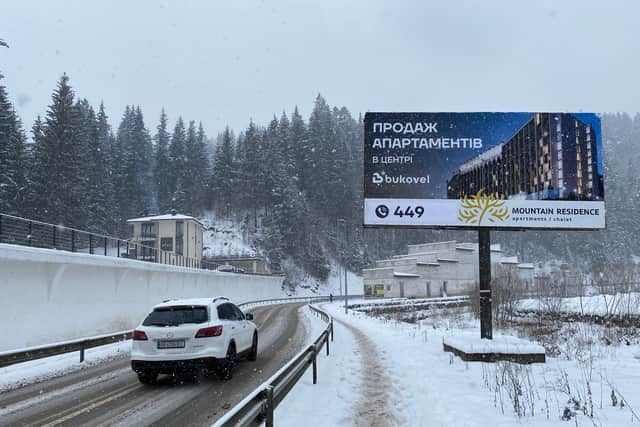

Arriving in Bukovel
But hidden away in this forest lies a land abundant with high-rise hotels, multi-storey car parks, sushi restaurants and pristine bike-lanes - welcome to Bukovel: Eastern Europe’s largest ski resort.
I was greeted by a string of road-side billboards advertising designer ski gear, luxury coffee machines and penthouse apartments for sale in one of the local new builds - all well out of the financial reach of the local people. Here, it’s easy to forget the horrors that unfold every day in the east of the country - Bukovel is by all means a normal ski resort, well-sheltered from the outside world.
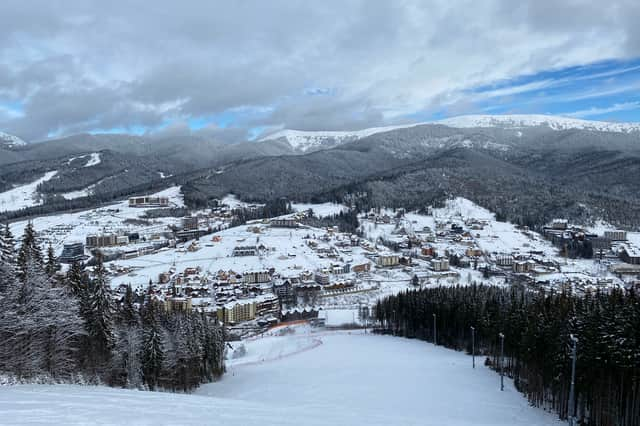

The crowds are made up of mainly Ukrainian tourists - who wander around the resort geared up for a day on the slopes - although I was told in previous years, the slopes here would attract the likes of Germans, Saudis and Indians.
Advertisement
Hide AdAdvertisement
Hide AdHaving settled in here, I booked myself in for a ski lesson online. The morning of my lesson started off me clearing snow from my car - It had been snowing all night and was -10C outside.
Snow eventually cleared, I set off to rent some skis - with one of Bukovel’s many rental places conveniently located just opposite the ski school. The ski shop would be a familiar sight to any frequent Argos goer. All very sophisticated - to order the complete kit, customers needed to enter their weight and height details on one of the many fixed in-store tablets then a sales assistant behind the counter would hand you your order.
Having entered my details, I was given a pair of skis, poles, helmet and boots - all for 580 UAH a day (£13). Given its proximity to the lift, this particular shop was very popular, there were at least a dozen others trying on skis at the time.
They keep your passport while you have the kit and give it back on return - not a great feeling when you’re in a country under martial law - it also leaves you stranded in the resort as you’re supposed to carry your passport at all times. Kit sorted, I was introduced to my ski instructor for the day, Viktoria.
Advertisement
Hide AdAdvertisement
Hide AdViktoria, who spoke perfect English, rekindled me with skiing, having not been up a mountain for over five years. I soon realised I wasn’t as appalling up on the slopes as I initially expected, and during our first run I got my first taste of skiing in Ukraine.
The pistes were of great condition, the lifts were safe, efficient and comfortable, there were initially few queues both on the slopes and at the lifts - everything was perfect. I’d easily say it was better than skiing in the Alps, and spending your life savings doing so.
The sinister whine of an air raid siren in the distance
I had quickly forgotten I was sliding down a mountain in one of the most dangerous regions on the planet - but as we neared the end of our first run that all changed. Viktoria and I were slowly skiing towards the bottom of the mountain, with the resort in view. We’d stopped to review my poor posture on the skis when the sinister whine of an air raid siren abruptly starts blaring in the distance.
It was the first time I’d heard it - a terrifying sound - I still panic when thinking back to it. The alert lasted for two hours, but the sirens stop after five minutes.
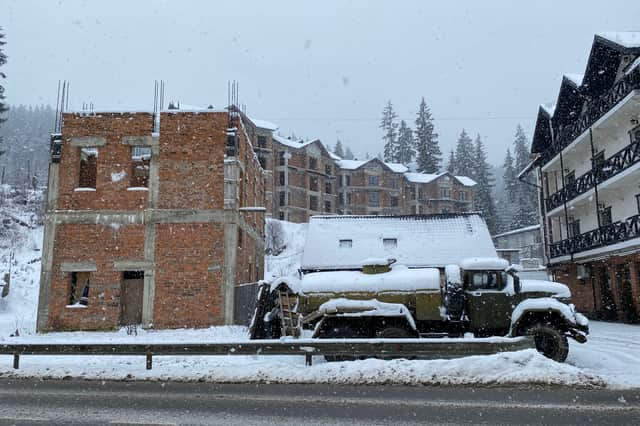

Advertisement
Hide AdAdvertisement
Hide AdIt’s recommended that during an alert you go into a shelter but nobody at the resort does - after the sirens stop you’d easily forget anything was amiss. The alerts are very much precautionary in these parts. At the time of writing this, a missile hasn’t landed in the region for around a month. The last time one did, it failed to explode.
The lifts keep going and skiers keep coming… In fact, as the day went on and the alert remained in place, the slopes actually got busier. The danger now wasn’t from falling bombs, it was from other skiers.
The slopes became so busy, I’d be forced to look over my shoulder every time I made a turn to ensure someone didn’t crash into the back of me - many of the locals would ski down, at max speed, only to lose control and then fall over.
After my successful skiing lesson I walked around the place - between the modern and bustling environment of the resort were hints of a military presence. I’d very occasionally spot a soldier wandering around, hidden within flocks of tourists dressed in brightly coloured ski coats. In-between the Teslas and Mercs on the local roads you’d get the occasional Soviet-made military coloured ZIL trucks transporting something important… judging from the police escort they’d have with them.
Advertisement
Hide AdAdvertisement
Hide AdSupper back at the hotel was briefly interrupted by a power cut - the room went pitch black and the rather repetitive Ukrainian pop music abruptly stopped. Power cuts are a common occurrence here, but thanks to hotel generators they last momentarily, never longer than a full minute.
By the time you’ve finished dinner there isn’t much to do aside from go to bed - the local curfew means you’re not allowed out from 10pm until 6am.
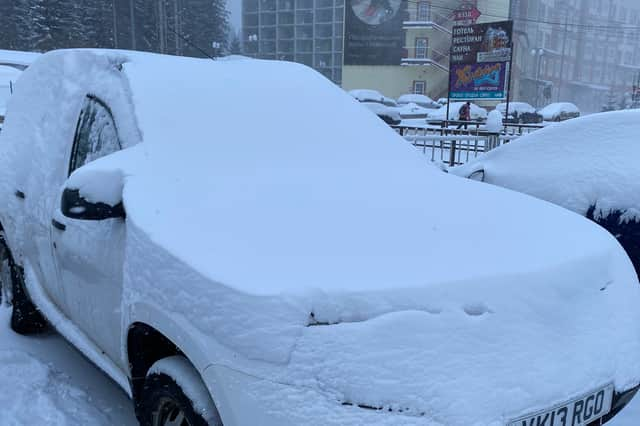

The following day I made a journey to the region’s capital, Ivano-Frankivisk. The biggest challenge on the two-hour journey was the snow - I left early in the morning, before the roads had been gritted. It had been snowing straight for the previous three days.
It seemed every time I approached a particularly icy right-hand bend, a massive queue of quickly incoming vehicles would appear, suddenly causing me to yell out-loud in panic and frustration. Regardless, my car did exceptionally well on the ice - I remember climbing a steep hill when a £100,000 Toyota Land Cruiser in front lost traction and skidded right into a mound of snow. I smugly overtook in my bottom-of-the-range Dacia Duster my insurance provider valued at no more than £2,000.
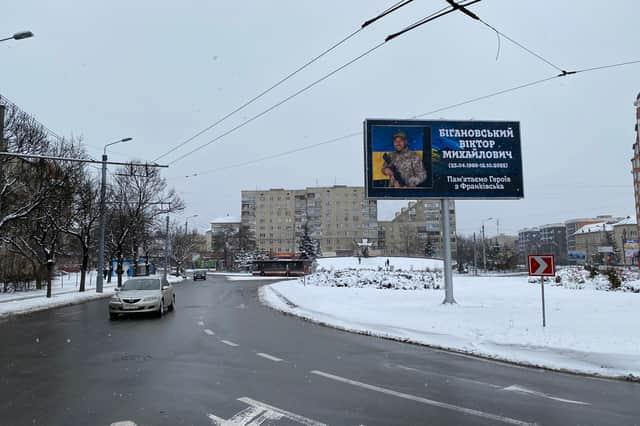

Advertisement
Hide AdAdvertisement
Hide AdWhen I arrived in Ivano-Frankivisk, I took a brief walk. The city of around 250,000 is now home to many refugees from the East of the country. It seemed an exceptionally quiet city - there were no hints of war aside from the scarce army outpost or billboards put up in memory of fallen soldiers on the frontlines.
My holiday in Ukraine, although enjoyable, ended up being a little mundane.
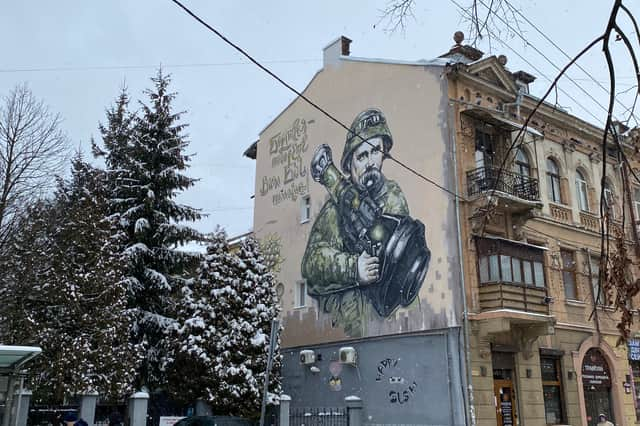

I think the Foreign Office, and many western governments, firmly advising against travel to all regions of Ukraine is harsh - the west of the country felt totally calm and relatively safe. Still, I’m not sure I’d recommend Ukraine for a holiday - the air-raid sirens and army checkpoints do induce a certain anxiety - it definitely wouldn’t be a fun excursion for the whole family. This is without mentioning the fact getting to the country is a major hurdle - especially if you don’t drive.
Travelling in Ukraine also leaves you with an expected sadness. The people here are so honest and genuine, but you realise even in the far-west they have to put up with air-raid sirens, restrictions on freedom and fear of what the future holds on a daily basis.
Comment Guidelines
National World encourages reader discussion on our stories. User feedback, insights and back-and-forth exchanges add a rich layer of context to reporting. Please review our Community Guidelines before commenting.